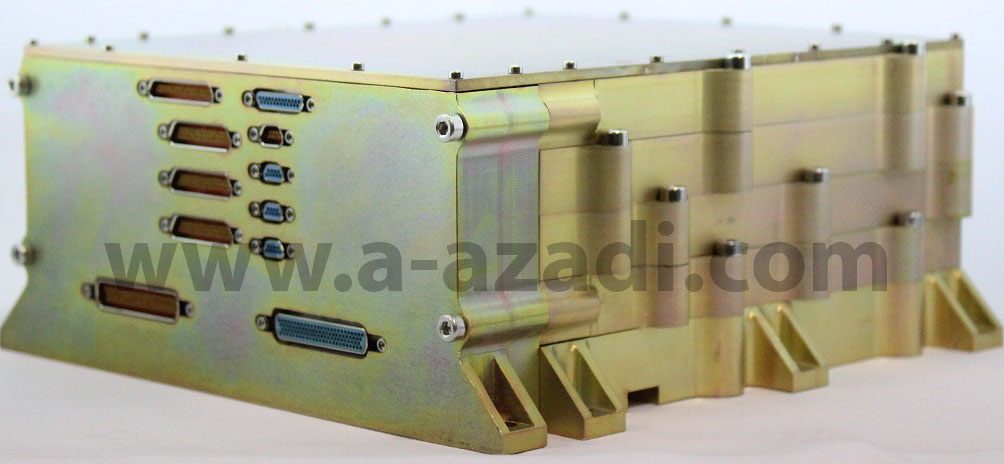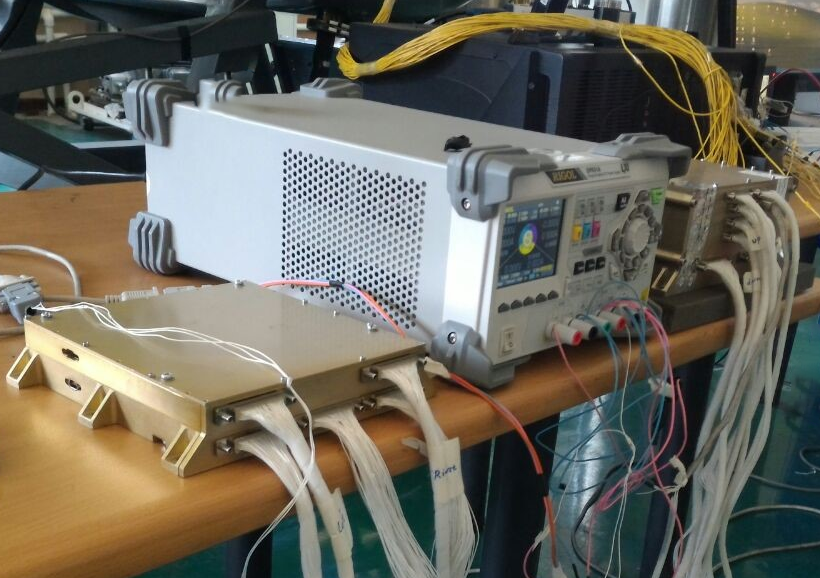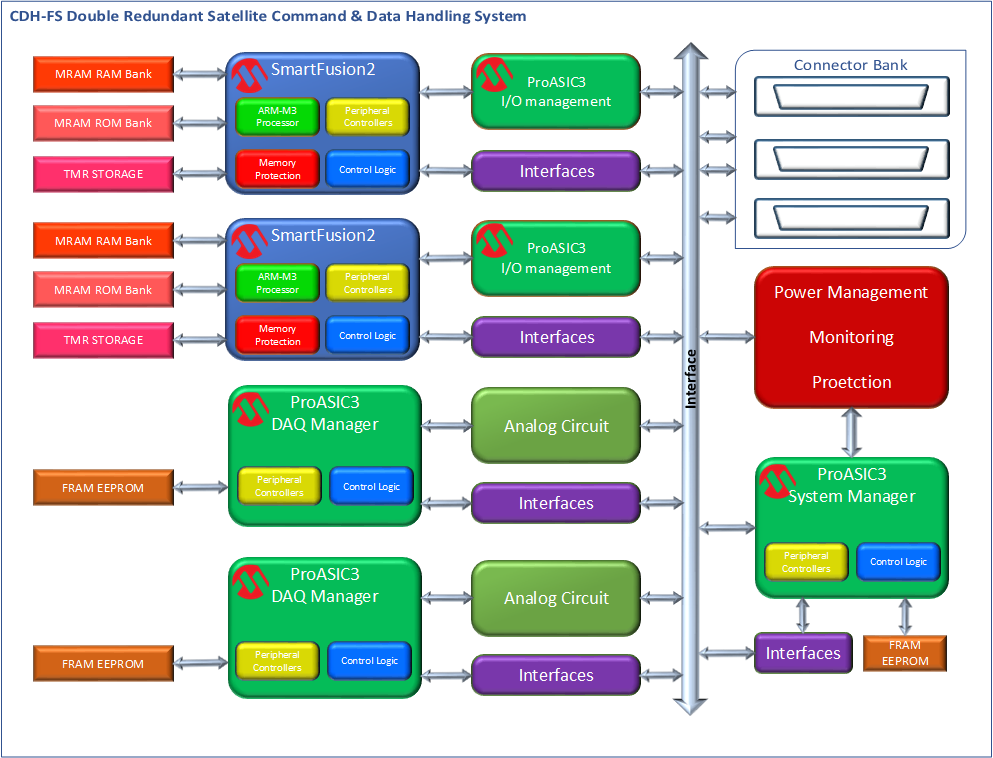CDH-FS and CDH-Tester
High-Reliability Command and Data Handling Solutions

As an embedded systems designer and signal integrity engineer, I’ve had the privilege of working on numerous cutting-edge projects in the aerospace sector. One of the standout projects is the development of the CDH-FS (Command and Data Handling – Full Redundant System) and its complementary CDH-Tester. This page provides a detailed overview of these two critical components designed for high-reliability satellite operations.
CDH-FS: Command and Data Handling System
The CDH-FS is a full redundant command and data handling system, meticulously engineered to ensure the highest levels of reliability and performance in space missions. This system is designed to handle the critical functions of satellite operations, from processing commands to managing data.
Key Features
- Redundancy: The CDH-FS features a fully redundant architecture, ensuring continuous operation even in the event of component failures. This is crucial for maintaining the integrity of satellite missions.
- High Reliability: Built with radiation-tolerant components, the CDH-FS is designed to withstand the harsh conditions of space, providing reliable performance throughout the mission.
- Advanced Processing: Equipped with state-of-the-art FPGA/SoC technology, the CDH-FS delivers high processing power and flexibility, capable of handling complex data processing tasks.
- Versatile Interfaces: The system supports a wide range of communication protocols, including SpaceWire, Ethernet, CAN bus, and RS-422/485, ensuring seamless integration with other satellite subsystems.
CDH-Tester: Ensuring Robust Testing and Validation
To complement the CDH-FS, I designed the CDH-Tester, a specialized testing platform that allows for comprehensive validation of the CDH-FS system. The CDH-Tester ensures that all functions of the CDH-FS are thoroughly tested and validated before deployment.

Key Features
- Comprehensive Testing: The CDH-Tester is capable of testing all interfaces and functionalities of the CDH-FS, including command processing, data handling, and communication protocols.
- User-Friendly Interface: The tester is equipped with a PC application that simplifies the testing process, providing an intuitive interface for running tests and analyzing results.
- High Accuracy: With precise measurement and monitoring capabilities, the CDH-Tester ensures that the CDH-FS meets all performance and reliability standards.
Environmental Tests for CDH-FS
The CDH-FS undergoes rigorous environmental testing to ensure its reliability in space conditions. These tests include:
- Vibration Tests: Both random and sinusoidal vibration tests simulate the mechanical stresses during launch and operation.
- Pyroshock Testing: Evaluates the system’s resilience to shock events, such as stage separations or payload deployment.
- Thermal Vacuum Testing: Ensures the CDH-FS can withstand the extreme temperatures and vacuum conditions of space.
- EMC/EMI Testing: Guarantees the system functions correctly without being affected by, or causing, electromagnetic interference.
Technical Specifications
CDH-FS
- Processor: ARM Cortex-M3 core at max 166MHz on SmartFusion2 Flash Based FPFA SoC
- Memory: 160Mbits MRAM (RAM), 96Mbits MRAM (ROM), 96Gbit SLC NAND Flash, 256K Serial FRAM, 256M Serial NOR
- Digital/Analog Interfaces: 100 Digital Outputs, 90 Digital Inputs, 128CH ADC, 2CH DAC, 10PWM/Pulse
- Serial Interfaces: 5 CAN2.0, 8 Full-Duplex RS422, 8 Half-Duplex RS485, 1 RS232, 1 I2C, 1 SPI
CDH-Tester
- Processor: Microblaze on Xilinx Spartan-6 FPGA
- Interfaces: 128CH DAC, 2 ADC, 100 Digital Outputs, 100 Digital Inputs, 8 RS422, 8 RS485, 5 CAN, 1 RS232, 1 USB<>Serial for PC communication
- Additional Features: PIC18 Microcontroller for general-purpose tasks, 8CH ADC for current monitoring, Digital Inputs for control signals, Digital Outputs for reset and other controls
Applications
The CDH-FS and CDH-Tester are integral components for ensuring the success of satellite missions. Their high reliability, comprehensive testing capabilities, and advanced processing power make them ideal for a wide range of applications, including:
- Satellite Command and Control: Managing and executing satellite commands with high reliability.
- Data Handling and Processing: Efficiently processing and managing data from various satellite subsystems.
- Fault Detection and Recovery: Ensuring continuous operation through intelligent fault detection and recovery mechanisms.
- Mission Validation: Thorough testing and validation of satellite systems before deployment.
Conclusion
Developing the CDH-FS and CDH-Tester has been a challenging yet rewarding experience. These systems represent a significant advancement in satellite command and data handling technology, providing robust solutions for high-reliability missions. I am proud of the work done on these projects and look forward to continuing to innovate in the field of embedded systems for aerospace applications.
